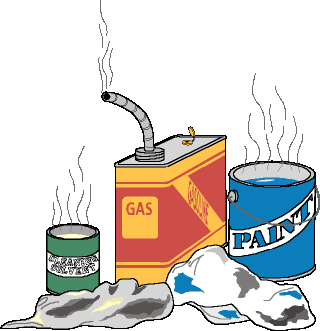They are lurking everywhere. They are in your kitchen, your bathroom, your garage and your backyard. They come in all shapes, sizes and colours. What are they? They are potentially poisonous substances within easy reach of children.
The Ontario Poison Centre provides expert poison advice 24 hours a day, seven days a week to the general public as well as health-care professionals within the province of Ontario. The local telephone number is (416) 813-5900; the toll-free number is 1-800-268-9017. The service is free of charge.
Q: What is a poison?
A poison is any substance that can be harmful if swallowed, breathed in, splashed on the skin or splashed in the eyes. Even substances meant to be helpful, such as medicines, natural or herbal remedies, and vitamins, can be harmful if used incorrectly.
Poisons come in many forms including: medicines; cosmetic and personal care products; cleaning product; automotive products; pesticides; berries; mushrooms growing on lawns or in wooded areas; and household plants.
Q: How can poisonings be prevented?
Poisonings can be prevented if parents take the necessary precautions. It is important to stay one step ahead of your child and poison-proof the home before he or she is old enough to access harmful substances. Here are some poison prevention tips:
- Lock up your household poisons - All harmful substances should be stored in a locked cupboard or container.
- Lock up your medicines - All medicine including prescriptions, over-the-counter medicine, natural or herbal remedies and vitamins should be stored in a locked cupboard or container. The Ontario Poison Centre recommends a tackle box or tool box with a lock.
- Do not rely on child-resistant lids - Many parents believe that bottles are made to be child-proof. Unfortunately, this is not the case.
- Read labels of medicine before giving - Make sure you read the label each time you give to make sure you are giving the right medicine and the right amount. Turn on the light if you are giving the medicine in the dark.
- Buy products only in the amount needed.
- Never mix household cleaning products.
- Teach your child the hazard symbols on household products. These symbols tell you if the product is poisonous, corrosive, flammable or explosive.
- Always keep the Ontario Poison Centre phone number near your telephone.
Q: What should parents do when a poisoning occurs?
Always call the Ontario Poison Centre first. You will speak with a poison specialist nurse or pharmacist who will be able to answer all of your questions. Call the centre every time a poisoning occurs. The specialists at the centre have the most up-to-date information on poisonings and are the best resource for helping you decide what to do.
Here are some First-Aid measures that you can do at home. Remember to call the Ontario Poison Centre even if you have done First-Aid.
For swallowed poisons:

- If the person is awake and alert give sips of water
- If the person is not able to wake up, is having trouble breathing, is convulsing or is having trouble drinking even sips of water then call 9-1-1 right away
- Do NOT induce vomiting under any circumstances
For breathed-in poisons:
- Move the person to fresh air
- If the person is not breathing or is having difficulty breathing, call 9-1-1 right away
For poisons splashed on the skin or in the eye:
- Flush with lukewarm water for 15 minutes
- Do not put other chemicals onto the splash to neutralize it
- Remember to remove any clothing that might have come in contact with the poison
Q: What kind of information do you need when you call the Ontario Poison Centre?
Make sure you have the container or bottle in front of you when you call the Centre. This will help the Poison Specialist know exactly what your child has taken, the ingredients, and the amount swallowed.
You will also be asked for your name and telephone number as well as your child's name, gender, age, weight and general health. These questions help the Poison Specialists make an accurate assessment and provide the best possible advice.
Q: What are the most common calls?
The Ontario Poison Centre receives calls on many different products. The top 10 most common exposures in children 5 years and younger, were:
- Pain Relievers
- Cleaning Substances

- Cosmetics and Personal Care Products
- Vitamins
- Foreign Bodies
- Skin Creams
- Plants
- Cough and Cold Medicines
- Pesticides
- Antihistamines